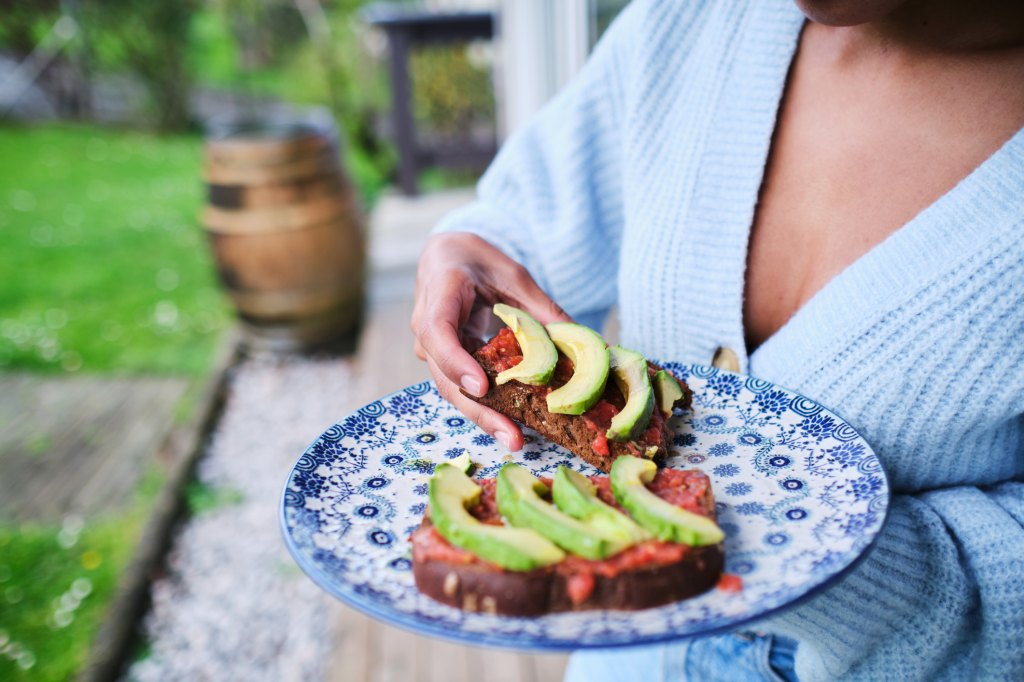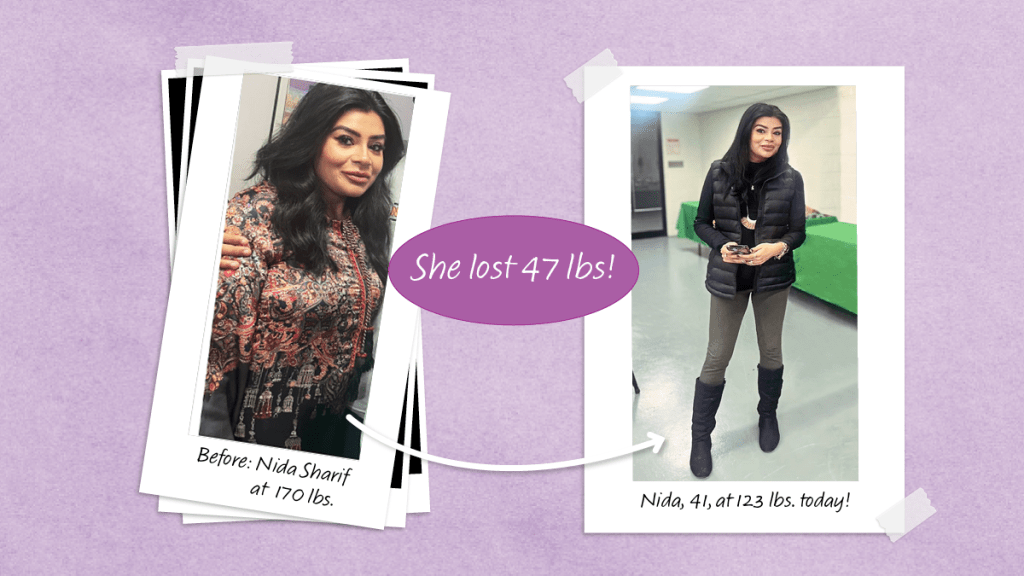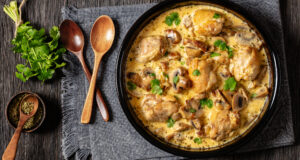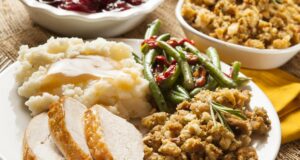Low-fat diets are problematic, says world-renowned internist and regenerative physician Michael Aziz, MD, author of the bestselling books The Perfect 10 Diet and The Ageless Revolution. Why? When fat is removed from foods, chemicals are often added. Plus, low-fat fare doesn’t satisfy cravings so we end up overindulging on processed, health-harming options. “We eat more sugar, chemicals and refined carbs that spike insulin—the fat-storing hormone—making us hungrier.” That equals 400 more calories per day, he says. Instead, research shows we need to eat fat to lose fat. Here, how adding the right, healthy dietary fats to your routine can help you reach your weight goals.
Does research support eating fat to lose fat?
According to a study published in 2015 in The Lancet, eating higher-fat diets led to significantly greater weight loss than eating lower-fat diets. That’s why Dr. Aziz says, “Do not fear natural fats.” In general, we want folks to avoid trans fats from fast food, as well as ultra-processed fats found in refined seed oils like soybean oil and vegetable oil, sometimes called “dark calories,” from fried foods. He explains, “These oils create free radicals when they are heated, so they damage the cell walls. Not a good thing when you’re trying to protect your cells.” Luckily, there are plenty of other, healthier fats to choose from to boost your health.

Which healthy fats support weight loss?
Dr. Aziz has been telling people to eat real foods—especially real fats—for years because they help with body fat reduction and decrease inflammation. Here are a few “super” fats to include…
Butter: a fat-burning ‘superfood’
Organic, grass-fed butter is the highest source of body fat-burning conjugated linoleic acid (CLA). This was shown to reduce body fat by 70 percent in an animal study published in the American Journal of Physiology. Dr. Aziz even calls butter a “superfood.”
Avocados: nature’s Ozempic
Another nutrient-dense fat: avocados. “One 2019 study in Nutrients found that adding avocado to breakfast improved satiety and meal satisfaction while influencing hormones tied to fullness, like GLP-1,” the same hormones stimulated by the drug Ozempic, says Wendy Bazilian, DrPH, author of Eat Clean, Stay Lean, and host of the podcast 1,000 Waking Minutes.
What’s more: In a 2021 Nutrition study, women who ate one avocado daily lost more belly fat than those who skipped the snack. Bazilian says, “It’s fascinating research that challenges misconceptions about fats and highlights how fiber and good fats may support weight management.”
Macadamia nuts: the omega-7 powerhouse
You’ve likely already heard of omega 3-6-9 fatty acids that feature heavily in the Mediterranean Diet. But Dr. Aziz also touts a virtually unknown type of fat called omega-7 fatty acids, found in macadamia nuts and discovered at the Harvard School of Public Health in 2008. What are some omega-7 fatty acids health benefits? They have been shown to improve metabolism and reduce obesity, plus lower the risk of type 2 diabetes, boost “good” HDL cholesterol and calm the inflammation that can lead to stroke and increase your risk of heart disease. Dr. Aziz adds, “This newly discovered fat molecule is so important that Harvard Medical School has applied for a patent on it.”
“We must consume the very thing we’ve been told to avoid like the plague for the past 60 years.” -Elizabeth Bright, DO
Why women need more healthy fats
Eating healthy fats is especially key as women age. Why? When ovaries produce less estrogen with menopause, women lose their ability to metabolize carbs, leading to weight gain. “A diet high in carbohydrates and low in fat will cause insulin and cortisol levels to rise,” explains osteopathic physician Elizabeth Bright, DO, author of Good Fat Is Good for Women: Menopause.
The flip side: “Eating good fat is a simple way to reset the whole system. Eating fat can lower your insulin level in 15 minutes,” she says. In fact, our body can continue to make some estrogen from the animal fat we eat. The challenge: “We must consume the very thing we’ve been told to avoid like the plague for the past 60 years.”
Dr. Aziz’s recommended daily fat intake
In his latest book, The Ageless Revolution, Dr. Aziz recommends eating clean foods, including lots of plants and natural, healthy fats. He suggests a flexible framework for macronutrients: Eat about 40 to 45 percent of your daily calories from healthy carbs (like veggies and fruits), 40 percent from natural fats (like olive oil and avocado) and 10 to 15 percent from protein (like poultry, fish, seafood, eggs and beans). He finds that these whole foods optimize cellular functioning and hormonal balance—not just insulin, but also leptin, which controls appetite and weight, as well as fat-burning human growth hormone. He says, “While The Ageless Revolution is not a diet book per se, it leads to weight loss.” So consider a veggie omelet with cheese, whole-wheat toast with butter and berries for breakfast; grilled shrimp and a green salad with olive oil and lemon for lunch; and chicken or salmon with a side of steamed veggies for dinner.

Success stories: real people who lost weight by eating more fat
Carly, one of Dr. Aziz’s patients, lost 120 pounds in her 40s. And Deborah Ripley shed 14 pounds and regained her youthful energy with Dr. Aziz’s advice. She shares, “I used to be tired all the time. I turned 70 this year and celebrated by running my first 10K—my score put me in the top 10 percent of runners my age. I’ve never felt or looked better!” She doesn’t think of age as a number but says, “I used to feel invisible. Being able to wear skinny jeans and having a boyfriend who thinks I’m a hottie is a change!”
Nida dropped from a size 10 to a 4!
“I had mentally given up,” Nida Sharif openly admits. Struggling with sleeplessness, emotional distress and a reliance on comfort foods like chips, cookies and donuts, she found herself unable to make progress, even with Rx weight-loss meds. “I hated looking older than I should,” she says.
That was until she met Michael Aziz, MD. “I realized I had been approaching everything all wrong,” she reflects. “He taught me how to balance my hormones through a proper diet.” By replacing processed foods and unhealthy fats with nutrient-dense items like protein-rich salads, chicken, beans, air-fried vegetables, nuts and full-fat yogurt—along with supplementing with omega-3 fats—Nida shed about 3 pounds of stubborn, stuck-on fat each month.
“I started losing weight in my legs first,” she says. In one year, she lost nearly 50 pounds. As a busy director of community development and a mother of two, Nida now radiates confidence. “The moment I switched to eating healthy, everything changed—my energy, mental clarity, weight and sleep,” she says. “I feel rejuvenated!”
How to add more healthy fats to your diet
To get the most from Dr. Aziz’s diet plan, follow these key points…
- Eat a healthy fat source with every meal and snack. Dr. Aziz stresses, “We need to add more fats to our diets, not exclude them.”
- Eat your greens: Aim to eat 5 to 7 servings of veggies and 2 servings of fruit per day.
- Up your protein intake: Have 1 to 3 servings of protein per day (the size of the palm of your hand) from fish, legumes, mushrooms and poultry. If you’re older and prone to muscle loss, bump your protein intake by up to 20 percent of your daily calories.
- Practice intermittent fasting twice a week. “Just eat brunch and dinner on those days.”
- Limit simple carbs like candy, white rice and white pasta that spike blood sugar.
- Supplement with at least 1 gram a day of omega-3 fatty acids, like Nordic Naturals Ultimate Omega gummy chews.
Healthy fats for sustainable weight loss: a cheat sheet
Some dietary fats work like body fat-burning foods. So use them as natural weight-loss solutions. Here, Dr. Aziz’s six favorite fats to add to your diet.
- Wild fish, rich in omega-3s
- Extra virgin olive oil, rich in unsaturated fats and “an unsung hero in longevity”
- Macadamia nuts, for omega-7s
- Organic butter from grass-fed cows, rich in vitamins A, D, E and K, as well as omega-3 fatty acids
- Avocados, for monounsaturated- fats and fiber
- Coconut, rich in fat-burning medium-chain triglycerides
This content is not a substitute for professional medical advice or diagnosis. Always consult your physician before pursuing any treatment plan.




